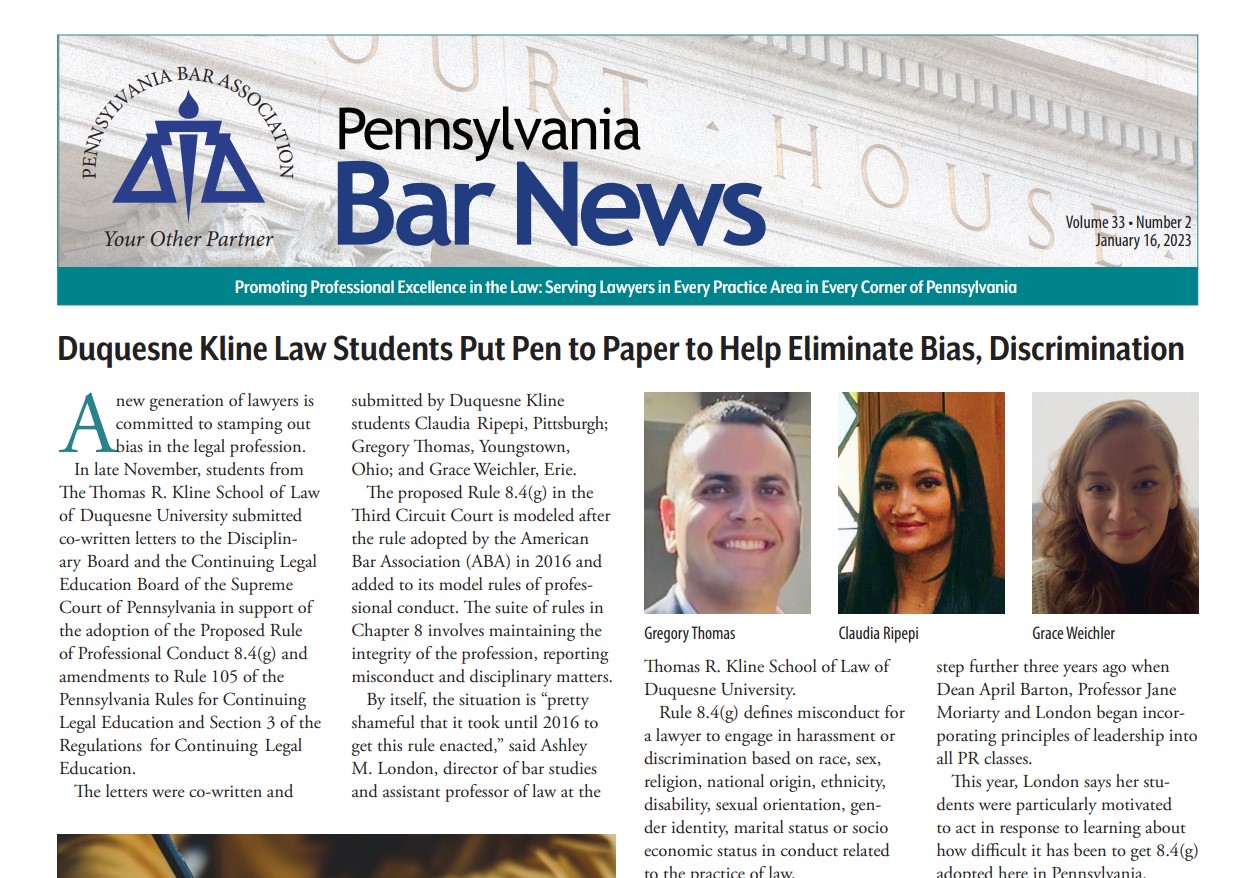Three Thomas R. Kline School of Law of Duquesne University students were featured in the recent edition of Pennsylvania Bar News. The article about the trio’s work appeared in the top front page of the publication. It described the brave, important letter these students coauthored in favor of adopting 8.4(g) in the Commonwealth of Pennsylvania.
 Claudia Ripepi, 3L, Gregory Thomas, 3L, and Grace Weichler, 2L, collaborated on this
initiative. They sent their cowritten letter to the Disciplinary Board and the Continuing
Legal Education Board of the Supreme Court of Pennsylvania. The letter was in support
to adopting the Proposed Rule of Professional Conduct 8.4(g) and amendments to Rule
105 of the Pennsylvania Rules for Continuing Legal Education and Section 3 of the
Regulations for Continuing Legal Education.
Claudia Ripepi, 3L, Gregory Thomas, 3L, and Grace Weichler, 2L, collaborated on this
initiative. They sent their cowritten letter to the Disciplinary Board and the Continuing
Legal Education Board of the Supreme Court of Pennsylvania. The letter was in support
to adopting the Proposed Rule of Professional Conduct 8.4(g) and amendments to Rule
105 of the Pennsylvania Rules for Continuing Legal Education and Section 3 of the
Regulations for Continuing Legal Education.
Ripepi, Thomas, and Weichler were motivated by their Duquesne Kline Law Professional responsibility (PR) course taught by Ashley M. London, director of bar studies and assistant professor of law. In that class, they learned about Rule 8.4(g), defined as misconduct for a lawyer to “engage in harassment or discrimination based on race, sex, religion, national origin, ethnicity, disability, sexual orientation, gender identity, marital status or socio-economic status in conduct related to the practice of law.” Additionally, they talked about the law at the national and state levels. Their discovery at the difficulty in adopting it in the Commonwealth of Pennsylvania was the impetus for their work.
“Professor London brought up the topic in class and Greg, Grace, and I jumped on the opportunity to use our voices to try to effectuate change. We all worked together the entire time on every aspect of the letter,” said Ripepi.
The group were personally taken aback that in the respected profession of law this rule is not on the books in Pennsylvania.
“To me, the idea behind the letter was to drum up discussion and get people to think critically about where we as a profession may be falling short,” Thomas said.
A belief of Duquesne is equity and opportunity begin at home. This letter was a clear integration of that notion. “Implementing a rule of professional conduct like 8.4(g) would certainly aid in creating opportunities and environments in the legal profession that would be more conducive to the inclusion of individuals from all walks of life,” Weichler said.
For the group, part of the importance of the letter is it directly relates to their chosen profession. “Writing this letter was important to me because before I am a (soon-to-be) lawyer, I am an advocate. The practice of law is all about advocacy and advocating for change, so it only seemed right to advocate for a legal field that is not riddled with discrimination and hatred. 8.4(g) is not an extreme rule that would bar all discrimination; simply, it would ban lawyers from using discriminatory language and actions in the practice of law,” Ripepi said.
Thomas originally thought the rule was unnecessary, but upon more thought changed his mind. “I thought the profession could police itself and weed out 'bad actors.' But upon further class discussion, I realized two important things: there are no real remedies for individuals who suffer from discrimination within our profession and perhaps most importantly, allowing discrimination to continue without consequences drives certain people away from our profession and undermines its credibility and the rule of law as a whole,” he said.
The three authors of this letter aspire to continue being advocates and pursuing justice as their careers progress.
“My advocacy will continue to be the driving force behind pursuing a career in the legal field. We must, as lawyers, advocate for what is just and fair, even if it makes us uncomfortable or is unpopular,” said Ripepi.
Weichler agreed. She said, “Moving forward, I plan on focusing my studies and activities towards legal issues that are attempting to create a more equitable society, legal or otherwise.”
News Information

